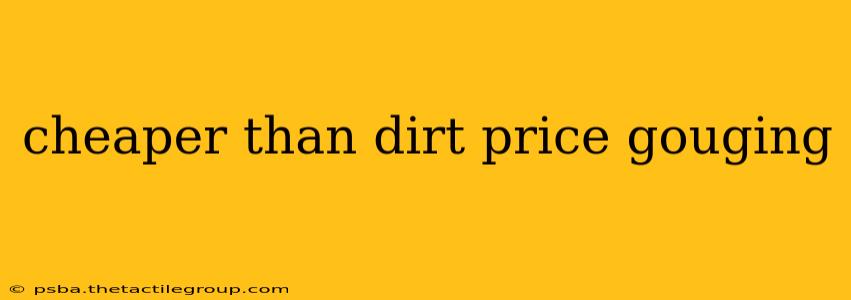The online retailer Cheaper Than Dirt has faced accusations of price gouging, particularly during periods of high demand for firearms and ammunition. This article delves into these allegations, explores the legal definition of price gouging, and examines the consumer protections available to those who believe they've been unfairly charged.
Understanding Price Gouging
Price gouging, in its simplest terms, involves charging excessive prices for goods or services during a period of high demand, emergency, or disaster. While there's no universally agreed-upon percentage increase that defines price gouging, many states have laws that prohibit excessive price hikes during declared states of emergency. These laws often focus on essential goods, including food, water, medicine, and in some cases, even firearms and ammunition. However, the legal definitions and enforcement vary widely by state and jurisdiction.
Cheaper Than Dirt and the Accusations
Numerous online forums and social media discussions allege that Cheaper Than Dirt has engaged in price gouging. These claims often center around significant price increases for firearms, ammunition, and related accessories, especially during periods of heightened demand, such as after mass shootings or during political uncertainty. Consumers cite examples of dramatic price jumps compared to historical pricing or competitor pricing, suggesting an unethical exploitation of consumer need. It's crucial to remember that these are allegations and not necessarily proven facts.
Analyzing the Arguments:
Several factors complicate assessing whether Cheaper Than Dirt's pricing constitutes price gouging:
- Market Fluctuations: The prices of firearms and ammunition are subject to significant market fluctuations based on supply and demand, raw material costs, and manufacturing capacity. A price increase alone doesn't automatically equate to price gouging.
- Wholesale Pricing: Cheaper Than Dirt, like other retailers, purchases products from wholesalers at fluctuating prices. These wholesale price changes can influence retail pricing.
- Demand Elasticity: The demand for firearms and ammunition is often inelastic; meaning demand doesn't change drastically with price increases. This factor might incentivize retailers to raise prices.
To determine if price gouging occurred, a comprehensive analysis would need to compare Cheaper Than Dirt's pricing to its historical pricing, competitor pricing, wholesale costs, and consider overall market trends. Simply pointing to higher prices without this context is insufficient to prove price gouging.
Consumer Protections and Recourse
Consumers who believe they've been victims of price gouging by Cheaper Than Dirt or any other retailer should:
- Document Everything: Keep records of purchase receipts, screenshots of online pricing, and any communication with the retailer.
- File a Complaint: Many states have Attorney General offices or consumer protection agencies that handle price gouging complaints. Contact the appropriate agency in your state.
- Explore Legal Options: In some cases, legal action may be an option, particularly if a state's price gouging laws have been violated. Consulting with a consumer rights attorney is advisable.
- Report to the Better Business Bureau (BBB): Filing a complaint with the BBB can help other consumers and potentially influence the retailer's practices.
- Leave Reviews: Publicly sharing your experience, both positive and negative, on review platforms can inform other potential customers.
Conclusion
Allegations of price gouging against Cheaper Than Dirt highlight the complex relationship between market dynamics, consumer needs, and ethical business practices. While increased pricing doesn't automatically constitute illegal activity, consumers have avenues for recourse if they believe they've been unfairly charged. Thorough documentation and engagement with consumer protection agencies are crucial for addressing these concerns effectively. It's vital for consumers to remain informed about their rights and to advocate for fair and transparent pricing practices in the marketplace.

